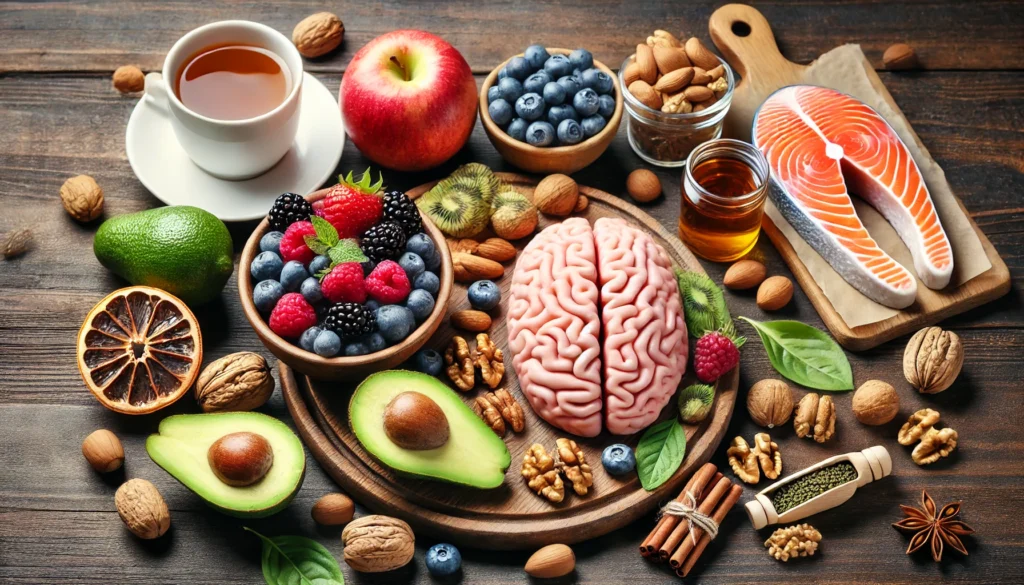In this article, we will explore the science behind cognitive development and share practical tips on how to optimize mental performance through simple lifestyle modifications.
You may also like: Top Herbs to Enhance Your Focus
Understanding Cognitive Function
Cognitive function refers to a range of mental abilities that include learning, thinking, reasoning, remembering, problem-solving, decision-making, and attention. These cognitive skills are essential for everyday activities and are influenced by both genetic and environmental factors.
The Brain: A Complex Organ
The brain is a complex organ composed of billions of neurons that communicate through chemical and electrical signals. Cognitive function relies on the efficient processing of these signals, which can be affected by various factors such as nutrition, physical activity, sleep, and stress levels.
Understanding the intricate network of neurons can provide insight into how different lifestyle choices impact cognitive abilities. For instance, the communication between neurons is facilitated by neurotransmitters, which can be influenced by dietary nutrients and hormonal changes. Therefore, maintaining a balance in the brain’s chemical environment is crucial for optimal cognitive function.
Neuroplasticity: The Brain’s Adaptability
Neuroplasticity, the brain’s ability to reorganize itself by forming new neural connections, is a key concept in cognitive development. This ability allows the brain to adapt to new experiences, learn new skills, and recover from injury.
Engaging in activities that challenge the brain can stimulate neuroplasticity, promoting mental agility and resilience. For example, learning a new language or taking up a musical instrument can create new neural pathways, enhancing cognitive capacity. Furthermore, neuroplasticity is not confined to younger individuals; adults can also benefit from activities that encourage brain flexibility.
Genetic and Environmental Influences
Cognitive function is shaped by an interplay between genetic predispositions and environmental factors. While genetics provide the foundation for cognitive potential, lifestyle choices and environmental exposures can significantly influence cognitive outcomes.
Research suggests that enriching environments can enhance cognitive development, even in individuals with genetic predispositions to cognitive impairments. This highlights the importance of creating environments that stimulate intellectual growth and emotional well-being. From early childhood through adulthood, continuous learning and exploration can mitigate genetic risks and promote cognitive health.
Lifestyle Changes to Boost Cognitive Function
Here are several lifestyle changes that can help improve cognitive brain function and enhance cognitive skills:
Nutrition: Fueling the Brain
A well-balanced diet is vital for cognitive health. Consuming a variety of nutrient-rich foods can support brain function and protect against cognitive decline. Essential nutrients for brain health include omega-3 fatty acids, antioxidants, vitamins, and minerals.
Omega-3 Fatty Acids: Essential for Brain Health
Omega-3 fatty acids, found in fatty fish, flaxseeds, and walnuts, are crucial for maintaining healthy brain cell membranes and promoting communication between neurons. These essential fats are known to reduce inflammation and improve mood, which can indirectly enhance cognitive performance.
Incorporating omega-3-rich foods into your diet can be an effective strategy for maintaining cognitive health. Studies have shown that individuals with higher omega-3 intake have better memory and cognitive function. Consider adding fish oil supplements if dietary intake is insufficient, but consult with a healthcare professional first.
Antioxidants: Protecting the Brain
Foods rich in antioxidants, such as berries, dark chocolate, and green tea, help neutralize free radicals and reduce oxidative stress, which can damage brain cells. Antioxidants play a vital role in maintaining the integrity of neurons and supporting overall brain health.
Regular consumption of antioxidant-rich foods can lead to improvements in memory and cognitive function. Including a variety of colorful fruits and vegetables in your diet can provide a broad spectrum of antioxidants, offering comprehensive protection against cognitive decline.
Vitamins and Minerals: Supporting Cognitive Processes
Vitamins like B6, B12, and folic acid, along with minerals like iron and magnesium, play a crucial role in brain function. These nutrients are involved in neurotransmitter synthesis, energy metabolism, and neural communication.
Leafy greens, whole grains, and lean meats are excellent sources of these nutrients. Ensuring adequate intake of vitamins and minerals can prevent deficiencies that may impair cognitive performance. Consider speaking with a nutritionist to assess your dietary needs and make necessary adjustments.
Physical Activity: Exercising the Mind and Body
Regular physical activity is not only beneficial for physical health but also crucial for cognitive function. Exercise increases blood flow to the brain, promoting the growth of new neurons and enhancing neuroplasticity.
Aerobic Exercises: Boosting Brain Power
Aerobic exercises, such as walking, swimming, and cycling, have been shown to improve memory, attention, and executive function. These activities increase the delivery of oxygen and nutrients to the brain, supporting cognitive processes.
Engaging in regular aerobic exercise can lead to long-term improvements in cognitive health. Consider incorporating activities like brisk walking or cycling into your routine to enhance brain function and overall well-being.
Strength Training: Building Mental Resilience
Incorporating strength training exercises can further support brain health by reducing stress and improving mood. Resistance exercises stimulate the release of endorphins, which can enhance mental clarity and focus.
Strength training can be a valuable addition to your fitness regimen, providing both physical and cognitive benefits. Aim to include exercises that target major muscle groups at least two to three times a week.

Flexibility and Balance: Enhancing Cognitive Flexibility
Flexibility and balance exercises, such as yoga and tai chi, can improve cognitive flexibility and reduce the risk of cognitive decline. These practices enhance coordination and mental focus, supporting overall cognitive function.
Consider integrating yoga or tai chi into your routine to benefit from their cognitive and physical advantages. These activities can also serve as effective stress management tools, promoting relaxation and mental clarity.
Sleep: Restoring the Brain
Quality sleep is essential for cognitive function, as it allows the brain to consolidate memories, repair itself, and clear out toxins. Chronic sleep deprivation can impair attention, memory, and decision-making abilities.
Establishing a Consistent Sleep Routine
To improve sleep quality, establish a consistent sleep schedule by going to bed and waking up at the same time each day. This helps regulate the body’s internal clock, promoting restful sleep and cognitive restoration.
Creating a sleep-friendly environment is crucial for achieving restful sleep. Ensure that your bedroom is dark, quiet, and comfortable to minimize disturbances and optimize sleep quality.
The Role of Relaxation in Sleep
Creating a relaxing bedtime routine can signal the brain that it’s time to wind down. Activities such as reading, listening to calming music, or practicing relaxation exercises can prepare the mind and body for restful sleep.
Limiting exposure to screens before bed is essential, as the blue light emitted by electronic devices can interfere with the production of melatonin, a hormone that regulates sleep. Consider adopting a digital detox policy in the evening to enhance sleep quality.
Managing Stress for Better Sleep
Ensuring a comfortable sleep environment and managing stress can also contribute to better sleep. Chronic stress can lead to sleep disturbances, impacting cognitive performance and overall health.
Incorporating stress-reducing activities into your daily routine can promote relaxation and improve sleep quality. Techniques such as deep breathing, meditation, and progressive muscle relaxation can be effective in reducing stress and enhancing sleep.
Mental Stimulation: Challenging the Brain
Engaging in mentally stimulating activities can help maintain and improve cognitive skills. Activities that challenge the brain, such as puzzles, reading, and learning new skills or languages, can promote neuroplasticity and enhance cognitive function.
Puzzles and Games: Exercising the Brain
Puzzles and games that require problem-solving and strategic thinking can enhance cognitive abilities. Regularly engaging in activities like crosswords, Sudoku, or chess can stimulate the brain and improve mental agility.
These activities can be enjoyable and rewarding, offering opportunities for cognitive growth and entertainment. Consider setting aside time each day to engage in a mentally stimulating activity of your choice.
Lifelong Learning: Expanding Cognitive Horizons
Lifelong learning, whether through formal education or self-directed study, can keep the brain active and engaged. Exploring new subjects and acquiring new skills can create new neural connections, supporting cognitive health.
Consider enrolling in a class or pursuing a new hobby to continue learning and expanding your cognitive horizons. Online courses and workshops offer convenient opportunities for intellectual growth and development.
Social Engagement: Strengthening Cognitive Connections
Social interactions are essential for cognitive health. Engaging in meaningful conversations and participating in social activities can help stave off cognitive decline and improve mental well-being.
Building and maintaining social connections can provide emotional support and intellectual stimulation. Consider joining clubs or groups that align with your interests to foster social engagement and cognitive enrichment.

Stress Management: Balancing the Mind
Chronic stress can have detrimental effects on cognitive function, impairing memory, attention, and decision-making. Practicing stress management techniques, such as mindfulness, meditation, and deep breathing exercises, can help reduce stress and improve cognitive performance.
Mindfulness and Meditation: Cultivating Mental Clarity
Mindfulness and meditation practices can enhance cognitive function by promoting relaxation and mental clarity. These techniques encourage focused attention and present-moment awareness, reducing stress and cognitive overload.
Consider integrating mindfulness practices into your daily routine to experience their cognitive benefits. Short meditation sessions or mindful breathing exercises can be effective tools for managing stress and enhancing mental performance.
Hobbies and Nature: Finding Balance
Finding time for hobbies and spending time in nature can contribute to reduced stress levels and improved cognitive health. Engaging in activities that bring joy and relaxation can provide a mental break and foster creativity.
Nature walks and outdoor activities can offer restorative benefits, promoting relaxation and cognitive rejuvenation. Consider incorporating nature-based activities into your routine to balance the demands of daily life.
Work-Life Balance: Prioritizing Mental Health
Maintaining a healthy work-life balance is crucial for cognitive well-being. Overworking and neglecting personal time can lead to burnout and cognitive decline.
Setting boundaries and prioritizing self-care can support mental health and cognitive performance. Consider implementing strategies to manage workload and allocate time for relaxation and personal interests.
Future Implications and Trends
As our understanding of cognitive function and brain health continues to evolve, emerging trends and technologies offer promising avenues for cognitive enhancement.
Nootropics and Supplements
Nootropics, also known as “smart drugs,” are substances that claim to enhance cognitive function. While some nootropics have shown potential benefits in boosting memory and focus, more research is needed to determine their long-term effects and safety.
Natural Supplements: Potential Cognitive Enhancers
Natural supplements, such as ginkgo biloba, bacopa monnieri, and rhodiola rosea, have been studied for their potential cognitive-enhancing properties. These herbal supplements are believed to support memory and cognitive function through various mechanisms.
Before incorporating any new supplements into your routine, it’s essential to consult with a healthcare professional. Understanding potential interactions and effects is crucial for safe and effective supplementation.
The Science Behind Nootropics
While nootropics offer intriguing possibilities for cognitive enhancement, the scientific community continues to explore their mechanisms and efficacy. Some compounds may enhance cognitive abilities by modulating neurotransmitter levels or improving blood flow to the brain.
Ongoing research is needed to determine the long-term safety and effectiveness of nootropics. As interest in cognitive enhancement grows, it is important to approach these substances with caution and informed judgment.
Ethical Considerations in Cognitive Enhancement
The use of nootropics and cognitive enhancers raises ethical considerations, particularly regarding access and fairness. As these substances become more popular, discussions about their implications for society and individual well-being are essential.
Balancing the potential benefits and risks of cognitive enhancement requires careful consideration of ethical and societal factors. Engaging in informed discussions can help guide responsible use and policy development.
Brain Training Apps and Devices
The rise of digital technology has led to the development of brain training apps and devices designed to improve cognitive skills. While some studies suggest that these tools can enhance specific cognitive abilities, their effectiveness in producing long-lasting improvements remains a topic of debate.
The Role of Digital Technology in Cognitive Enhancement
Brain training apps and devices utilize digital technology to provide targeted cognitive exercises. These tools are designed to challenge specific mental abilities, such as memory, attention, and problem-solving.
While initial studies show promise, further research is needed to determine the long-term impact of digital cognitive training. Understanding the limitations and potential benefits of these tools is crucial for informed use.
Evaluating the Effectiveness of Brain Training
The effectiveness of brain training apps and devices varies, with some users experiencing noticeable improvements in cognitive performance. However, the extent to which these gains translate to real-world cognitive tasks remains uncertain.
Consider using brain training tools as part of a comprehensive cognitive enhancement strategy. Combining digital exercises with other lifestyle changes can provide a holistic approach to cognitive development.
Future Directions in Cognitive Technology
As technology continues to advance, the potential for cognitive enhancement through digital tools expands. Future developments may include personalized cognitive training programs and integration with wearable technology.
Staying informed about emerging trends in cognitive technology can offer new opportunities for enhancing mental performance. Engaging with innovative tools and approaches can help optimize cognitive health in the digital age.

Conclusion
Enhancing cognitive function through lifestyle changes is an achievable goal that can lead to improved mental performance and overall well-being. By prioritizing nutrition, physical activity, sleep, mental stimulation, and stress management, individuals can support their cognitive health and maintain mental sharpness throughout their lives.
As new research and technologies emerge, staying informed and open to new possibilities can help optimize cognitive development and unlock the full potential of the human brain. Embracing a proactive approach to cognitive health can lead to a fulfilling and intellectually enriching life.
Further Reading:
Defining the 6 Key Domains of Cognitive Function
Important Note: The information contained in this article is for general informational purposes only, and should not be construed as health or medical advice, nor is it intended to diagnose, prevent, treat, or cure any disease or health condition. Before embarking on any diet, fitness regimen, or program of nutritional supplementation, it is advisable to consult your healthcare professional in order to determine its safety and probable efficacy in terms of your individual state of health.
Regarding Nutritional Supplements Or Other Non-Prescription Health Products: If any nutritional supplements or other non-prescription health products are mentioned in the foregoing article, any claims or statements made about them have not been evaluated by the U.S. Food and Drug Administration, and such nutritional supplements or other health products are not intended to diagnose, treat, cure, or prevent any disease.


